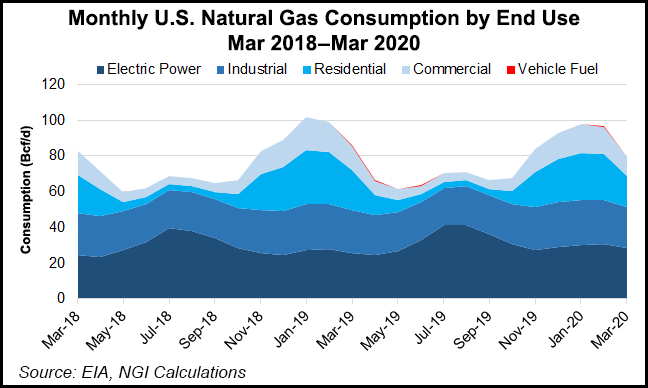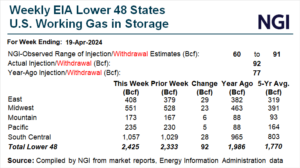NGI The Weekly Gas Market Report
Coronavirus | Daily GPI | NGI All News Access
Natural Gas Utilities Ready to Assist as Covid-19 Lockdown Moratoriums Lifted

As areas of the United States begin transitioning to another new normal by slowly reopening to recover from Covid-19, some natural gas utilities are also shifting their pandemic policies and attempting to help their customers along the way.
National Association of Regulatory Utility Commissioners (NARUC) President Brandon Presley has established a task force to focus on emergency preparedness, chaired by Arkansas Commissioner Kimberly O’Guinn.
According to NARUC, recent extreme weather events, natural disasters and the coronavirus have made the nation aware of how necessary it is to have access to energy, as well as the importance of essential energy services. The task force would help to protect the reliability of energy systems and work to create more resilient infrastructure in the event of future large-scale and catastrophic events.
Among its goals are to conduct research and provide ongoing education on federal funding to support recovery, as well as provide education on lessons learned from the pandemic and best practices for moving forward.
Presley also organized a special subcommittee to explore the national response to the pandemic. Washington state commissioner Ann Rendahl would be the chair to gather, examine and analyze regulatory and industry actions and responses.
“In our review of the national response to Covid-19, the special subcommittee will specifically review issues related to impacts on customers, utility and state commission workforce, utility financial approaches to the pandemic response and other key challenges,” said Rendahl. “This information will help guide our members and the broader regulatory community as we manage our response to Covid-19 and plan for future crises.”
Customers First
Headquartered in Chicago, Commonwealth Edison Co., or ComEd, is also working to help its customers recover from economic challenges caused by the pandemic. ComEd, the Illinois Commerce Commission (ICC), as well as a group of stakeholders announced a comprehensive customer support package on Thursday.
In mid-March, the ICC issued an emergency interim order requiring that utilities suspend disconnections and waive new late fees. Now, the ICC and ComEd have worked to determine that the order would remain in effect until Illinois moves to phase four of the Restore Illinois plan, or until Aug. 1.
“Although ComEd’s bills are lower than they were more than a decade ago, we recognize that our bills are only one piece of the puzzle as many Illinois families are experiencing financial hardship and related anxiety right now,” said ComEd CEO Joe Dominguez. “This is an extremely difficult time, and we are committed to doing everything we can to help ease our customers’ financial burden. That’s why we have worked closely with a broad coalition of stakeholders to design an unprecedented and comprehensive support package that provides support to customers who need it most.”
ComEd’s customers, mostly in Illinois (70%), can expect support package options to include bill assistance for households earning less than 150% of the federal poverty level, longer payment plans spanning up to 18 months for residential customers or 24 months for low-income customers, and extended fee relief. Other assistance also will be available.
Elsewhere, the Iowa Utilities Board (IUB) has allowed the state’s utilities to follow a phase-in approach to reinstating disconnections beginning at the end of May. Investor-owned utilities (IOU) may resume disconnections by July 1.
The IUB requires a gradual phase-in approach to disconnections to allow customers affected by the pandemic time to seek or contact financial assistance, or enter a payment agreement with a utility. Customers with health conditions that require the use of electric or natural gas service must be allowed a 30-day extension. Additionally, if a customer or member of the customer’s household tested positive for coronavirus, the utility may grant a 30-day extension before service is disconnected.
IOUs in Iowa are subject to the same disconnection requirements, though they may decide to waive some, or all, of a customer’s past due amount.
In Wisconsin, regulators also announced that the temporary moratorium on disconnections of water, electricity and heat will be lifted as the moratorium ends on July 25. The Public Service Commission originally issued the temporary ban on disconnections and collecting late fees in March.
Municipal Electric Utilities of Wisconsin executive director Tim Heinrich, as well as multiple utility representatives, feared that customers were likely to fall behind on their bills if the moratorium remained in place for too long.
“If the customer cannot get current on [their bill] and the utilities have to take a write-off, then those costs get passed on to all utility customers,” said Heinrich.
The state’s major utilities have witnessed an extreme increase in unpaid bills, with We Energies reporting unpaid bills has grown by $16.8 million compared to the last three-year average. Wisconsin Public Service Corp. also witnessed its past-due balance increase by $3.4 million for residential and nonresidential customers. Madison Gas & Electric Co. reported its unpaid bills were 11% higher for residential customers, and 120% higher for nonresidential customers.
Data submitted by Wisconsin’s 26 utilities showed that on average, less than 13,000 disconnections are made from April 15 through May 15 each year. The commission said most utilities did not disconnect service during the same timeframe this year except in instances of meter tampering or dangerous conditions.
The Wisconsin Citizens Utility Board is urging utilities to provide customers with more flexibility, especially those facing economic challenges from Covid-19. Additionally, if customers receive a disconnection notice, they may apply for assistance.
Meanwhile, Colorado Gov. Jared Polis issued an executive order earlier in June with new requirements for utilities. Polis had extended the expiration date of the moratorium for utility disconnections three times since March 20, but he did not extend the moratorium in his executive order. The executive order entailed a 30-day extension to suspend accrual of late payment fees, as well as the waiver of reconnection fees for all residential and small business customers.
Colorado residential customers of IOUs, which include Xcel Energy Inc., Black Hills Energy, Atmos Energy and Colorado Natural Gas Inc., require medical certificates stating that disconnecting service would be dangerous to the health or safety of the customer or a member of the customer’s household. If a medical certificate from a health practitioner or doctor is provided to the IOU, service is to continue for up to 90 days.
The Colorado Public Utilities Commission consumer affairs unit is available to assist customers unable to reach an agreement on a payment plan with their utility.
Extending Moratoriums
Elsewhere, the Virginia State Corporation Commission (SCC) extended the statewide moratorium on service disconnections for utility customers due to unpaid bills through Aug. 31. The Virginia SCC had extended the moratorium once previously.
“Our purpose since our original order on March 16 imposing a moratorium on service shut-offs has been to protect Virginia’s utility customers who, through no fault of their own, have been the victims of the devastating economic consequences of the Covid-19 pandemic,” the SCC said. “While we have acted promptly throughout this crisis to protect customers unable to pay utility bills due to the Covid-19 crisis, the only truly sustainable solution is government action beyond utility regulation in the immediate short term and a restoration of economic health as soon as possible.”
Before extending the moratorium, the SCC requested comments and received more than 300 from members of the General Assembly, Gov. Ralph Northam, numerous utilities, organizations and citizens.
“The reality is that a moratorium on all service disconnections due to unpaid bills is not sustainable on an unlimited basis in the absence of programs to ensure that the growing costs of unpaid bills are not unfairly shifted to other customers,” the SCC said. “This additional extension will give the General Assembly and governor time to address the economic repercussions of the Covid-19 crisis on utility customers, an effort alluded to in the letter…from the 58 General Assembly members as well as several other commenters.
“We emphasize that utility regulation alone cannot adequately address what is a much broader socioeconomic catastrophe,” the SCC added.
Over the course of the moratorium, the SCC said it would be monitoring the progress on reducing bills in arrears and service cut-offs by requiring monthly reports of key metrics.
Meanwhile, the Georgia Public Service Commission (PSC) voted to reinstate utility disconnection for nonpayment starting July 1. The PSC forewarned that an unusually high number of customers could be disconnected in a short period of time, which could result in disruption of service, as well as longer wait times to connect.
Georgia Power Co., a Southern Co. subsidiary that serves around 2.4 million customers in 155 of the state’s 159 counties, extended its moratorium on customer disconnections to July 15. It is also providing a special payment plan to assist their customers who have accrued past-due account balances during the pandemic. The plan allows customers to pay past-due balances over a six-month timeframe between October and March 2021 with no late fees.
Another Southern subsidiary, Atlanta Gas Light (AGL), is working along the PSC’s requirements and will continue to ban natural gas service disconnections until June 30. In the meantime, AGL is encouraging customers to contact their retail natural gas marketer to find out more about financial assistance programs. AGL also is working with its marketers to assist customers handle their past-due bills.
© 2024 Natural Gas Intelligence. All rights reserved.
ISSN © 1532-1231 | ISSN © 2577-9877 | ISSN © 1532-1266 |


